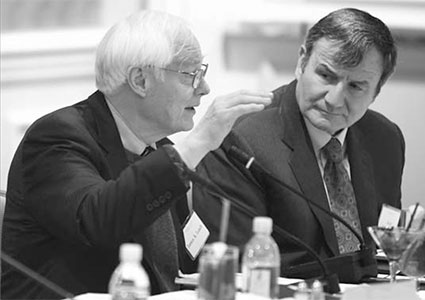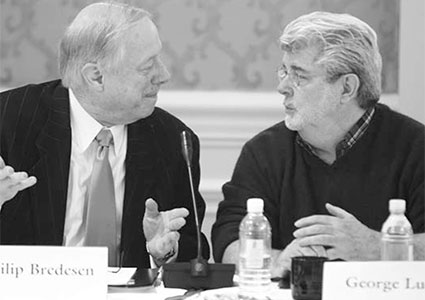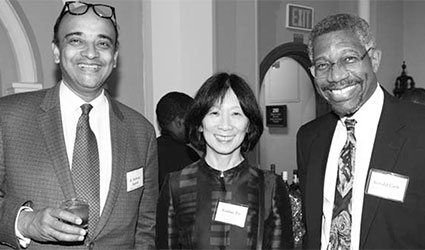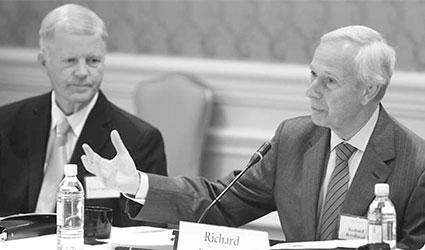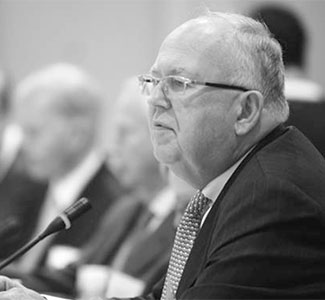American Academy and Royal Society Launch Joint Lecture Series on GREAT Science
The Internet has revolutionized how we use, access, and share information. As the technology becomes faster and more affordable, its benefits are reaching even more people and places. Yet as its user base broadens, the global Internet is increasingly fractured along national, linguistic, and cultural lines.
This was just one of several issues discussed at a recent Academy meeting on “The Evolution of the Internet: Challenges and Opportunities.” The meeting, held June 6, 2012, was presented in collaboration with the Royal Society and the British Consulate-General; it was moderated by Tom Leighton, Chief Scientist at Akamai Technologies and Professor of Applied Mathematics at the Massachusetts Institute of Technology (MIT). The program featured talks by Sir Tim Berners-Lee, Director of the World Wide Web Consortium and 3COM Founders Professor of Engineering at MIT, and David D. Clark, Senior Research Scientist at the MIT Computer Science and Artificial Intelligence Laboratory.
“The Internet, the World Wide Web, and Big Data are . . . fundamental to our shared prosperity and, indeed, our security going forward,” Budden said in his opening remarks. Academy President Leslie Berlowitz and British Consul General to New England Phil Budden welcomed more than 250 guests to the event, which was the first in a series on GREAT Science organized by the U.K. government’s Science and Innovation Network. “Fellows of the American Academy – from Charles Babbage to Tim Berners-Lee – have been instrumental in the creation of the Digital Age,” Berlowitz said. “Many of them have also been members of the Royal Society, so it is fitting that we begin our GREAT Science collaboration with a conversation about the future of the Internet.”
Tom Leighton began the discussion by addressing the consequences for governance and science in particular. “Making vast amounts of data freely available on the Web,” he noted, “could have fundamental implications for government transparency as well as for how scientific research is advanced in such areas as drug discovery, climate research, Web analytics, and many other fields.”
The panelists then discussed new opportunities and challenges for consumer access, as Web-based information proliferates. Tim Berners-Lee, who invented the World Wide Web in 1989, talked about increasing access through technologies such as mobile devices. “In developing countries, [mobile technology] is all they’ve got,” he said. “So if you can make the Web work on mobile devices, then you can get it to people who don’t have Internet connections by wire.” When one member of a village saves up to buy a smartphone, for example, the entire village gains access to information and communication capabilities that would not otherwise be available. The challenge, according to Berners-Lee, is for users to “make a connection to somebody who is on the other side of a boundary,” whether national, cultural, or geographic.
David Clark, who served as Chief Protocol Architect in the development of the Internet, examined the issues that develop in tandem with increased access and cross-border connections. “At the international level,” Clark noted, “we have a lot of disagreement about what the Internet should be.” Although the Internet has the technical capacity to carry information between machines anywhere in the world, the user experience differs from country to country – what Clark calls “the local character of the Internet.” Websites and content are tailored to local cultural and linguistic preferences: “If you look up something in a different country, it’s not just that it’s in a different language; you get a different answer,” he explained.
The meeting touched on a range of topics – government control, censorship, copyright law, and open data – including many that were explored in the Fall 2011 issue of Dædalus, “Protecting the Internet as a Public Commons,” which was guest-edited by David Clark.
American Academy and the Royal Society Launch GREAT Science Lecture Series
On June 6, 2012, the American Academy and the Royal Society launched a nationwide lecture series to celebrate scientific ties between the United States and the United Kingdom. The joint lecture series on GREAT Science was organized by the U.K. government’s Science and Innovation Network to profile international science excellence. The U.S. lecture series will feature Fellows of the American Academy and the Royal Society who will discuss scientific topics of significance to society. Future lectures are scheduled for Chicago, Atlanta, Houston, Los Angeles, San Francisco, Washington, New York, Ottawa, and Vancouver.
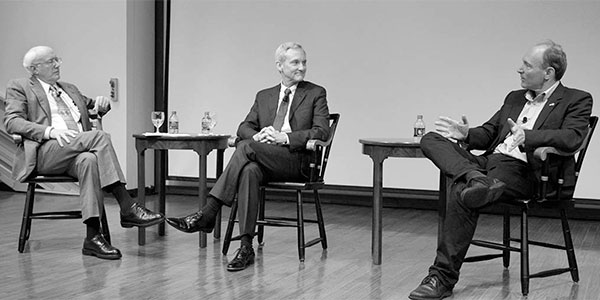 |
| From left: David D. Clark (MIT), Tom Leighton (Akamai Technologies; MIT), and Sir Tim Berners-Lee (World Wide Web Consortium; MIT) |
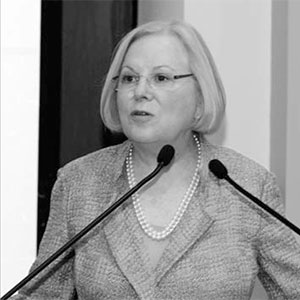 |
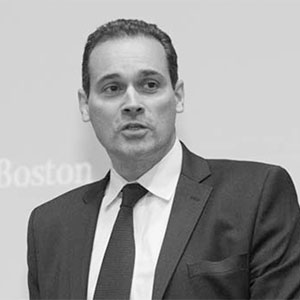 |
| Academy President Leslie Berlowitz and British Consul General to New England Phil Budden offer opening remarks at the American Academy and Royal Society inaugural program on GREAT Science. |
To view or listen to the presentations, visit https://www.amacad.org/content/events/events.aspx?d=476.
Nuclear Nonproliferation Diplomats Gather in Vienna
Every five years, the Treaty on the Non-Proliferation of Nuclear Weapons (NPT) comes up for review by member states. The next Review Conference will not take place until 2015, but delegates recently gathered in Vienna, Austria, for the first of three preparatory sessions. From April 30 to May 11, 2012, delegates discussed ways to ensure full implementation of the treaty and to promote its universality. They also considered what progress has been made to strengthen the NPT regime since the 2010 Review Conference.
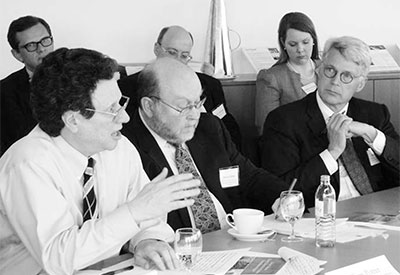 |
| William Potter (Monterey Institute of International Studies), Steven E. Miller (Harvard University), and Scott D. Sagan (Stanford University) |
With 190 member states, the NPT is notoriously difficult to manage and reform. Each state has different perceptions of the NPT’s adequacy and fairness, as well as its flaws and weaknesses. Learning how to bridge these differences will be crucial to the future success of the treaty. Over the last four years, the Academy’s Global Nuclear Future (GNF) Initiative has become a leader in this effort, publishing new ideas for NPT regime improvement in our occasional paper series and bringing together scholars and policymakers for debate and collaboration.
On May 4, 2012, the Academy convened more than fifty of the senior-level government representatives gathered for the Preparatory Committee meeting to address challenges facing the NPT regime. Organized in collaboration with the Vienna Center for Disarmament and Nonproliferation and the James Martin Center for Nonproliferation Studies, the symposium was chaired by leaders of the GNF Initiative: Steven E. Miller, codirector (Harvard University); Scott D. Sagan, codirector (Stanford University); and Robert Rosner, senior advisor (University of Chicago). More than twenty-five countries were represented at the meeting.
The off-the-record conversation explored many of the ideas set forth in Nuclear Collisions: Discord, Reform & the Nuclear Nonproliferation Regime, a recent publication from the GNF Initiative. In that paper, Steven Miller outlines the main points of contention within the NPT regime and prescribes five ways to manage, minimize, or even overcome these divergences. “The Academy symposium in Vienna was a tremendous opportunity to share our work and findings with practitioners who are involved in the regular management of the NPT regime,” said Miller.
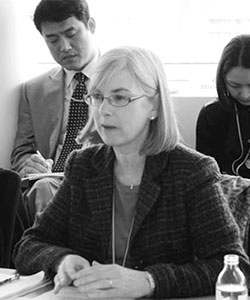 |
| Susan Burk (Special Representative of the U.S. President for Nuclear Nonproliferation, U.S. Department of State) |
Participants also heard brief opening remarks from Ambassador Susan Burk (Special Representative of the U.S. President for Nuclear Nonproliferation, U.S. Department of State), William Potter (Director of the James Martin Center for Nonproliferation Studies at the Monterey Institute of International Studies), CHIN Siew Fei (Counselor and Deputy Resident Representative of Singapore to the International Atomic Energy Agency), and Ambassador CHO Hyun (Embassy of the Republic of Korea to Austria and Permanent Mission of the Republic of Korea to the International Organizations in Vienna).
Scott Sagan remarked after the Vienna symposium that “these off-the-record meetings have become a valuable forum for sharing ideas about potential ‘win-win compromises’ between groups of states that have not previously seen common interests in specific NPT reform proposals. Steven Miller’s paper on Nuclear Collisions usefully outlines principles that could encourage further diplomatic and technical measures to strengthen the regime. Many of the diplomats at our meetings have said that the frank discussions of these kinds of proposals have helped them identify areas of potential common interest.”
The GNF Initiative is a comprehensive interdisciplinary, multi-institutional, and multi-national project; it is distinct in bringing together diverse communities to develop pragmatic approaches to limit the safety, security, and nonproliferation concerns associated with the global spread of nuclear energy. The work of the Initiative had an impact on the outcome of the 2010 NPT Review Conference and has informed the U.S. President’s Blue Ribbon Commission on America’s Nuclear Future as well as the 2010 and 2012 Nuclear Security Summits. The Initiative is working with nuclear newcomers to identify paths that permit the peaceful use of nuclear power while minimizing the potential adverse consequences of the spread of inherently risky nuclear technologies. The leaders of the Initiative will continue to inform international policymakers as they weigh the pursuit of nuclear energy programs alongside safety, security, and economic concerns.
The GNF Initiative is supported by Carnegie Corporation of New York; The William and Flora Hewlett Foundation; The John D. and Catherine T. MacArthur Foundation; the Alfred P. Sloan Foundation; the Flora Family Foundation; and Fred Kavli and the Kavli Foundation. The Academy is grateful to these foundations for advancing the work of the Initiative.
How Does the Nuclear Industry Learn and Adapt?
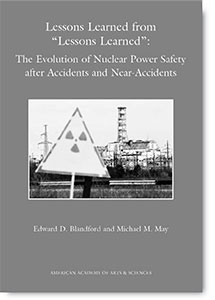 Invaluable lessons can be learned from serious nuclear accidents, such as those at Fukushima, Three Mile Island, and Chernobyl. Yet minor incidents and near-accidents provide important lessons as well. These experiences often reveal not only how to decrease the likelihood that the same mistakes will occur, but also how to avoid larger accidents that may be foreshadowed in earlier, smaller incidents.
Invaluable lessons can be learned from serious nuclear accidents, such as those at Fukushima, Three Mile Island, and Chernobyl. Yet minor incidents and near-accidents provide important lessons as well. These experiences often reveal not only how to decrease the likelihood that the same mistakes will occur, but also how to avoid larger accidents that may be foreshadowed in earlier, smaller incidents.
In Lessons Learned from “Lessons Learned”: The Evolution of Nuclear Power Safety after Accidents and Near-Accidents, Edward D. Blandford and Michael M. May enumerate the lessons from nuclear accidents and incidents, asking whether the nuclear energy community has indeed learned from those lessons. The authors argue that stakeholders must commit to ongoing improvement of their protocols and standards. Each nuclear incident – no matter its size – underlines the importance of pursuing high standards of safety, security, and proliferation resistance.
Blandford and May also emphasize the need for coordination among nuclear states. “Mechanisms to facilitate and, where needed, enforce mutual learning have not always been adequate,” they write. “Information-sharing, import/export agreements based on safety standards, agreements to facilitate cooperation among regulatory authorities, and the participation of financial interests such as investors and insurers all have a role to play in improving mutual learning among different states.”
May is Professor Emeritus (Research) in the School of Engineering at Stanford University, where he is also a Senior Fellow in the Freeman Spogli Institute for International Studies. He is former Codirector of Stanford’s Center for International Security and Cooperation (CISAC) and is Director Emeritus of the Lawrence Livermore National Laboratory. Blandford is a Stanton Nuclear Security Postdoctoral Fellow at CISAC; he also serves as an adjunct Research Assistant Professor in the Department of Chemical and Nuclear Engineering at the University of New Mexico.
Lessons Learned is the latest publication from the Academy’s Global Nuclear Future (GNF) Initiative, which is working to identify and promote measures that will limit the safety, security, and proliferation risks raised by the global expansion of nuclear energy. Through innovative scholarship and behind-the-scenes interactions with international leaders and stakeholders, the Initiative is developing pragmatic recommendations for managing the emerging nuclear order. The Initiative is led by Steven Miller, codirector (Harvard University); Scott Sagan, codirector (Stanford University); Robert Rosner, senior advisor (University of Chicago); and Stephen M. Goldberg, research coordinator (Argonne National Laboratory).
The GNF Initiative is supported in part by grants from Carnegie Corporation of New York, The William and Flora Hewlett Foundation, The John D. and Catherine T. MacArthur Foundation, the Alfred P. Sloan Foundation, the Flora Family Foundation, and Fred Kavli and the Kavli Foundation. The Academy is grateful to these supporters and to the project leaders for advancing the work of the Initiative.
Dædalus Explores New Directions for Science in the 21st Century
Recent scientific advances have fundamentally changed our understanding of the world. Many of these advances will have an enormous effect on society and the natural environment. For instance, DNA sequencing technologies have implications that range from treating neurologic disorders to optimizing plant cultivation, while tiny machines operating at the nanoscale may someday obscure the distinction between technology and life. Where will these developments take us next? How can they be applied to the most pressing challenges that we face?
In the Summer 2012 issue of Dædalus, “Science in the 21st Century,” leaders from the physical and biological sciences present engaging, accessible snapshots of recent research in their fields. They explore the practical applications of new discoveries and identify questions for further inquiry. Guest edited by Jerrold Meinwald, the Goldwin Smith Professor of Chemistry Emeritus at Cornell University, and May R. Berenbaum, Professor and Head of the Department of Entomology at the University of Illinois at Urbana-Champaign, the volume covers areas of study from planetary science, physics, mathematics, and chemistry to biology, ecology, and evolutionary theory. While celebrating the intellectual accomplishments of recent decades, the issue emphasizes that there is much left to learn.
The essays offer a view of where science is headed in the coming decades – not an easy task, the editors maintain. In his preface to the volume, Meinwald reflects on his own field of organic chemistry: “[M]ost of the work done by organic chemists in the year 2000 and beyond has depended heavily on the application of experimental techniques and on theories that simply did not exist a half-century earlier,” he writes. “The lesson (well known, but easily forgotten) is that anticipating future events is difficult.” Berenbaum echoes this sentiment in her essay: “The conduct of science depends on cold, hard, verifiable facts, and forecasting the future is necessarily rife with uncertainty.” In looking to the future, the essays are full of the sense of wonder that drives scientific inquiry. Robotic space exploration is homing in on worlds within our solar system that may have the potential to support life. Mathematical laws help us make predictions about the observable universe, from natural processes to social phenomena such as policy preferences. And new work in microbiology has revealed that bacteria communicate with one another and even organize to act collectively.
Many of the essays confront the most urgent threats to humankind and the planet: feeding a growing population as usable land and resources dwindle; using security, sustainability, and affordability as guideposts to rethink energy systems; mitigating rapid species loss due to pollution, climate change, and land degradation; and promoting biodiversity to restore the ecosystems that all life relies on to survive.
Whether we succeed in benefiting materially from the enormous strides that science is now making will be determined largely by how the public and particularly policy-makers respond to the ever-increasing understanding of where we and our world come from, and where the laws of nature will allow us to go.
